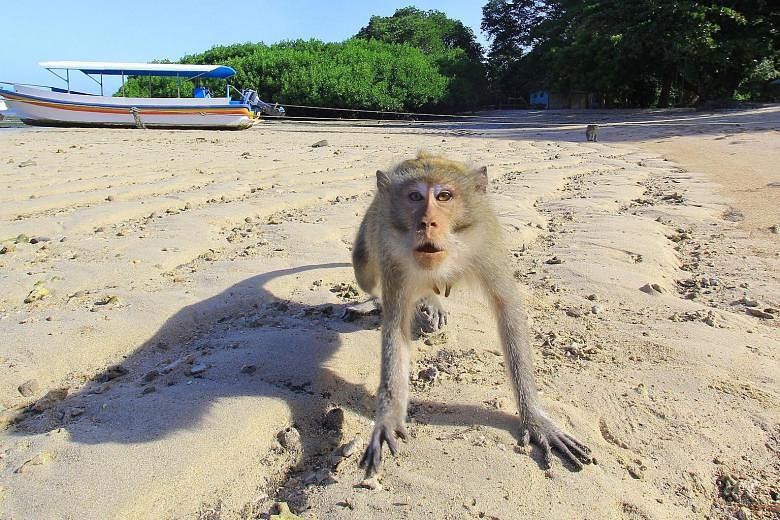BOYOLALI (Indonesia) • Over the next week, some areas in Boyolali regency in Indonesia's Central Java may resemble war zones, as hundreds of police and military personnel armed with rifles are deployed with orders to shoot on sight.
The targets, however, are not drug dealers or terrorists, but monkeys.
"The monkeys started coming here two months ago," said police chief Aries Andhi. "After we shot one of them, the rest didn't come back. Now they are back again."
The animals have wreaked havoc on crops. Houses have been looted and people attacked.
More than 100 shooters from the army and the police, as well as members of the Association of Indonesian Shooters, have been sent to hunt down the primates.
"This operation is not intended to kill, let alone exterminate the monkeys, but we do aim to secure people's farms and residences," Karanggede police chief Margono said, adding that they will use non-lethal rounds to shoot.
The shooters were deployed on Thursday and are to work for a week. Their operation will cover at least five villages in Sendang sub-district in Karanggede.
Locals have tried to get rid of the monkeys with wooden and bamboo sticks, but the animals kept returning. They also tried to fence their fields with nets, but the primates damaged the nets. The monkeys have lost their fear of humans, said Mr Purwanto of Karanggede.
"The more we try to get rid of them, the more aggressive the monkeys become. They leave but come back minutes later in much bigger numbers," he said.
At least 13 people, mostly children and senior citizens, have fallen victim to monkey attacks.
An 82-year-old grandfather needed 42 stitches on his arms and chest after he was attacked on Tuesday. He was using a stick to beat off the monkeys approaching his chicken cage, but the animals ran amok and fought back.
Animal rights activist Ning Hening said the shootings will not address the problem.
"A similar approach has been adopted in other regions, but the monkeys keep coming back when they are hungry," Ms Hening said.
She suggested putting wet chicken manure along the monkeys' usual routes.
"They will leave once they smell it. Farmers have applied this approach for ages," Ms Hening said.
Another way is to paint one of the monkeys red and release it back to its habitat, she added. "Other monkeys will run terrified once they see the red-painted monkey, thinking that it does not belong to their troop."
Residents say monkey attacks recur every dry season, but this time the monkeys seem to be more aggressive. They blame the situation on damage to the forests on the slopes of Mount Merapi that are the natural habitat of the primates.
THE JAKARTA POST/ASIA NEWS NETWORK, REUTERS

